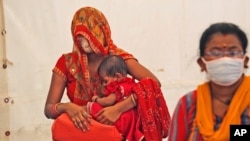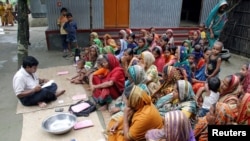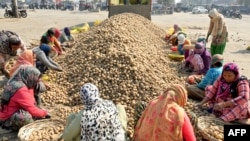International Women’s Day 2024: The Economy Has a Female Face

International Women’s Day, an annual U.N. campaign to publicize efforts to create gender equality worldwide, this year celebrates on Friday, March 8, the theme ‘Invest in women: Accelerate progress.’ The idea is that enabling women’s economic stability can go a long way toward achieving equality efforts. Jemimah Njuki, chief of the economic empowerment section at U.N. Women, said this year’s theme is pressing because ‘the world is actually at a crucial crossroads for gender equality.’ She noted that globally, women’s rights are increasingly coming under threat, or being rolled back, even in places where leaders thought they had made progress. According to U.N. Women, one in every 10 women today lives in extreme poverty. Their studies show that about 340 million women and girls — 8 percent of the world’s female population — will not have moved out of extreme poverty by 2030 if trends continue as they have. A core tenant of this year’s IWD is ‘implementing gender-responsive financing,’ an economic strategy that considers and analyzes the diverse needs of every person, including the historical underinvestment in essential services for women and girls, to ensure a fair distribution of resources. Women often bear the brunt of caretaking and budgeting duties in a household — especially in periods of crisis — when there is increased pressure on care systems and governments. According to the U.N. Women’s Progress on the Sustainable Development Goals snapshot for 2023, there is a $360 billion funding gap from governments for organizations and programs that support women. Some nongovernmental organizations work to bridge that gap by funding programs or providing loans to women. Robyn G. Nietert is the president and co-founder of the Women’s Microfinance Initiative, an organization that provides microloans and financial literacy training to women in poor, rural areas of Uganda, Kenya and Tanzania. She says that giving women loans to start their own businesses results in improved household living standards and support for families. ’People are economically active, otherwise, you’re dead,’ Nietert said. ‘If you’re not economically active, you’ve got to be doing something to get enough money to eat food, to get water, to have some place to live. So, virtually every time you make a loan, you are creating a success story, because you’re giving somebody who has nothing, and it’s still managing to survive a financial resource where they can start a business.’ The Women’s Microfinance Initiative also provides financial literacy training to teach women how to manage their money once they have it. ’It makes people feel like they have control of their lives,’ Nietert said, while also acknowledging the ability for exploitation by organizations that claim they want to provide loans. ’It’s not a big mystery, what exploitation is in the lending world,’ Nietert said. ‘It’s outrageous — interest rates, outrageous fees, huge amounts of collateral having to be pledged, not giving grace periods, taking the collateral, which then, of course, prohibits anybody from getting out of debt.’ She also noted that working in smaller, rural communities creates trust and social collateral that is enforced by the communities of women themselves to ensure people repay their loans. From Nietert’s perspective, the loans eliminate uncertainty, which gives women the freedom to pay attention to other aspects of their lives, such as childcare and health care. Beverley Francis-Gibson, the CEO of Together Women Rise, a group that gives grants to organizations that empower women and girls in low-income countries, shared an anecdote about her experience visiting four organizations TWR funds in India that work with young girls. ’The girls shared with us that, in their community, they’re seen as heroes,’ Francis-Gibson said. ‘Every single girl had a dream of changing the world for not only her family, but for herself. We had girls in this program who want to be members of parliament or go into international business. We had girls who were interested in becoming attorneys.’ Based on her observations, her experience emphasized her belief that when society invests in women and girls, they are empowered, which creates a healthier, safer, more peaceful and economically just world. International Women’s Day advocates for governments to be fully engaged to meet the diverse needs of women worldwide, using connections with the private sector and civil society to make the best choices to support women. ’We know that ... uplifting the world, uplifting communities comes one girl and one woman at a time,’ Francis-Gibson said. ‘But we also recognize that in order for us to be impactful, we also have to address the root causes, or the systemic barrier theory, that prevent women and girls from living their fullest potential.’ Njuki, of U.N. Women, noted that in order to make sustainable changes to create equality, the global community first needs to fully recognize the essential role women play. ’What the world needs to realize is that all those crises actually have a female face,’ Njuki said. ‘Climate change has a female face, conflicts have a female face. We are seeing more and more women living in conflict, and so we cannot address these issues- we cannot address this crisis — without investing in women. Because if we invest in women, we see much more progress in society, we see a more peaceful society.’
 FILE — Women wait to receive the vaccine for COVID-19 in New Delhi, India, Friday, July 2, 2021.
FILE — Women wait to receive the vaccine for COVID-19 in New Delhi, India, Friday, July 2, 2021.  FILE — Bangladeshi women wait for a volunteer to distribute their loan money collected from a microfinance agency at Manikganj,100 km (62 miles) from the capital Dhaka, Sept. 24, 2005.
FILE — Bangladeshi women wait for a volunteer to distribute their loan money collected from a microfinance agency at Manikganj,100 km (62 miles) from the capital Dhaka, Sept. 24, 2005.  FILE — Women laborers sort potatoes at a wholesale agriculture market on the outskirts of Amritsar on Feb. 28, 2024.
FILE — Women laborers sort potatoes at a wholesale agriculture market on the outskirts of Amritsar on Feb. 28, 2024.

